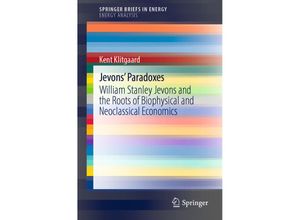I n 1865 economist William Stanley Jevons published The Coal Question describing the crucial
role that coal played in British economic development. Here he enunciated what has come to be
known as the Jevons paradox which stated that improvements in resource efficiency leads to
greater resource use as the expansion of scale occasioned by lower operating costs overwhelms
the savings due to greater efficiency. The implications for any sustainability scenario are
enormous and a major theme of this book. While The Coal Question provided the theory that was a
precursor to peak oil and resource limits to growth it was followed six years later by the
Theory of Political Economy the first English-language work of neoclassical economics which
denies the importance of energy as a special commodity. In spite of this apparent contradiction
in this book biophysical economist Kent Klitgaard makes clear that there is no epistemological
break between The Coal Question and Theory of Political Economy. Indeed the Jevons paradox
makes little sense in the absence of a behavioral theory grounded in marginal utility which
recognizes the satisfaction that each of us gains as consumers of one more unit of a good or
service. Jevons could not solve this paradox in light of his belief that coal mines were
becoming exhausted and more expensive to operate and that there was no substitute for coal.
However he was uninterested in questions of sustainability rather he wanted to maintain
British industrial and imperial dominance. Did the eventual substitution of oil for coal simply
allow us to run through other resources at an accelerated rate? Indeed the petroleum economy
of the 20th and early 21st centuries has presented vastly expanded opportunities for the
operation of the Jevons Paradox. This book shows the connections among the different paradoxes
in Jevons' work and exposes the potentially fatal flaws that confound technological solutions
to the sustainability challenge.

